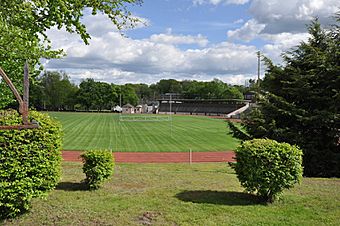Crocker Field facts for kids
Quick facts for kids |
|
|
Crocker Field Historic District
|
|
 |
|
| Location | Fitchburg, Massachusetts |
|---|---|
| Area | 5.5 acres (2.2 ha) |
| Built | 1918 |
| Architect | Olmsted Brothers; Gallagher, Percival |
| Architectural style | Classical Revival |
| NRHP reference No. | 01000651 |
| Added to NRHP | June 14, 2001 |
Crocker Field is a special outdoor place for sports and fun in Fitchburg, Massachusetts. It's mainly used by students from the Fitchburg Public School System. This large area covers about 5.5 acres (2.2 hectares) near the Nashua River.
The field has many different sports areas. You can find places to play both indoors and outdoors. There's also a big outdoor stadium and a building called a field house. A small building for tickets and snacks is also on site. A strong iron fence with concrete posts surrounds most of the area. Most of Crocker Field was built in 1918. Its beautiful design was created by the famous Olmsted Brothers. In 2001, Crocker Field was added to the National Register of Historic Places. This means it's an important historical site.
Contents
The Story of Crocker Field
A Gift to the City
Crocker Field began as a generous gift to Fitchburg in 1916. A man named Alvah Crocker II gave it to the city. He was the head of a big paper company called Crocker, Burbank & Co. Mr. Crocker wanted to help young people in the city. He hoped they would get involved in outdoor sports and activities.
At that time, Fitchburg's public schools did not have organized sports teams. But after this gift, new sports programs quickly started. This allowed students to use the amazing new facilities.
Designed for Sports and Fun
Alvah Crocker hired the Olmsted Brothers to design the sports park. This company was well-known for creating beautiful landscapes. Their plan included fields for baseball, football, and tennis. It also featured a running track and a field house.
Percival Gallagher, an architect from Olmsted Brothers, designed the features. He made sure everything was very strong and long-lasting. He used materials like stone, brick, and concrete. This helped keep maintenance costs low over time. Mr. Crocker also gave $38,000 to help pay for the field's upkeep. In 1921, he added more money for new features. These included a hockey field and a sprinting track.
A Place for Community Events
Since it was built, Crocker Field has been a main sports ground for high school teams. It hosts exciting events like football games against rival teams from Leominster. The field is also often used for high school graduation ceremonies. Sometimes, it even hosts big sports events for the whole region.
More to Explore



